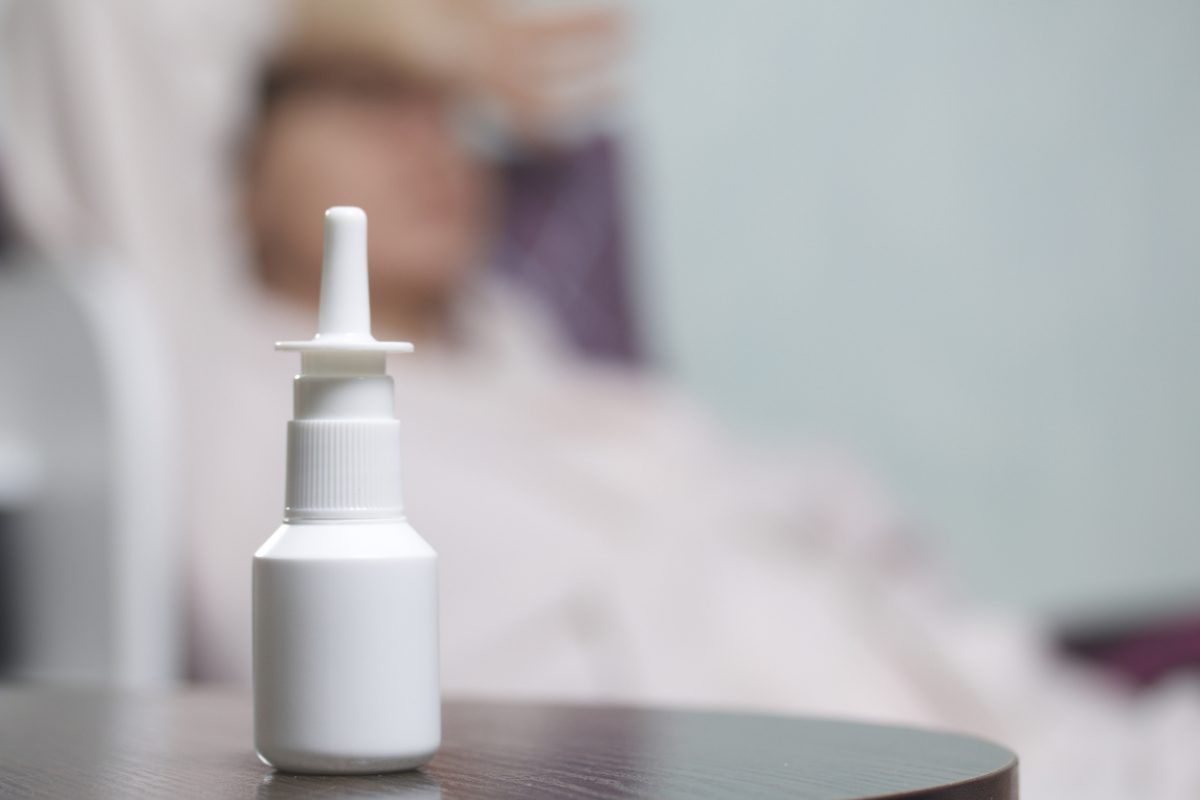Abstract
Objective: This study examined the efficacy of intranasal oxytocin (40 IU), compared to matching placebo (saline), when combined with Alcohol Behavioral Couple Therapy (ABCT) for the treatment of alcohol use disorder (AUD).
Methods: This 12-week clinical trial (2018–2024) utilized a double-blind, randomized, placebo-controlled design. Enrollment occurred from May 2019 to April 2023. Participants were romantic couples (N = 96 dyads; n = 49 oxytocin, n = 47 placebo) consisting of an identified patient (IP) with current AUD per DSM-5 and their partner. Dyads in which both partners had AUD were eligible, and both partners in each dyad were randomized to the same drug condition (ie, placebo or oxytocin). Participants were observed in their medication self-administration 30 minutes prior to ABCT therapy sessions. Primary outcome measures were alcohol consumption (percent days drinking and percent days heavy drinking; Time Line Follow-Back) and relationship functioning (Dyadic Adjustment Scale-Short Form).
Results: All IPs and 50% of partners met diagnostic criteria for AUD; 62 IPs (64.5%) met criteria for severe AUD. Findings from the intent-to-treat analyses indicate that IPs and partners in both conditions evidenced substantial improvements in alcohol consumption and alcohol problem severity but not relationship functioning. No group differences emerged in alcohol consumption, alcohol problem severity, or relationship functioning at end of treatment. Participants completed an average of 10.2 ABCT sessions (SD = 3.5). There were no group differences in the number of medication doses administered or adverse events.
Conclusions: Oxytocin was safe and tolerable but did not provide additional benefit beyond ABCT at the end of treatment. Alternative strategies are necessary to understand oxytocin’s potential to facilitate different domains of AUD recovery.
Trial Registration: ClinicalTrials.gov identifier: NCT03046836.
J Clin Psychiatry 2025;86(2):24m15627
Author affiliations are listed at the end of this article.
Members Only Content
This full article is available exclusively to Professional tier members. Subscribe now to unlock the HTML version and gain unlimited access to our entire library plus all PDFs. If you're already a subscriber, please log in below to continue reading.
References (42)

- MacDonald K, MacDonald TM. The peptide that binds: a systematic review of oxytocin and its prosocial effects in humans. Harv Rev Psychiatry. 2010;18(1):1–21. PubMed CrossRef
- Guastella AJ, MacLeod C. A critical review of the influence of oxytocin nasal spray on social cognition in humans: evidence and future directions. Horm Behav. 2012;61(3):410–418. PubMed CrossRef
- Grebe NM, Kristoffersen AA, Grøntvedt TV, et al. Oxytocin and vulnerable romantic relationships. Horm Behav. 2017;90:64–74. PubMed CrossRef
- Flanagan JC, Fischer MS, Nietert PJ, et al. Effects of oxytocin on cortisol reactivity and conflict resolution behaviors among couples with substance misuse. Psychiatry Res. 2018;260:346–352. PubMed CrossRef
- Flanagan JC, Nietert PJ, Sippel L, et al. A randomized controlled trial examining the effects of intranasal oxytocin on alcohol craving and intimate partner aggression among couples. J Psychiatr Res. 2022;152:14–24. PubMed CrossRef
- Ditzen B, Nater UM, Schaer M, et al. Sex-specific effects of intranasal oxytocin on autonomic nervous system and emotional responses to couple conflict. Soc Cogn Affect Neurosci. 2013;8(8):897–902. PubMed CrossRef
- McGregor IS, Bowen MT. Breaking the loop: oxytocin as a potential treatment for drug addiction. Horm Behav. 2012;61(3):331–339. PubMed CrossRef
- King CE, McGinty JF, Becker HC. Effects of oxytocin on stress-induced reinstatement of alcohol-seeking in mice with and without a history of stress. Alcohol. 2017;60:231–232. CrossRef
- Mitchell JM, Arcuni PA, Weinstein D, et al. Intranasal oxytocin selectively modulates social perception, craving, and approach behavior in subjects with alcohol use disorder. J Addict Med. 2016;10(3):182–189. PubMed CrossRef
- Lee MR, Weerts EM. Oxytocin for the treatment of drug and alcohol use disorders. Behav Pharmacol. 2016;27(8):640–648. PubMed CrossRef
- Houghton B, Kouimtsidis C, Duka T, et al. Can intranasal oxytocin reduce craving in automated addictive behaviours? A systematic review. Br J Pharmacol. 2021;178(21):4316–4334. PubMed CrossRef
- Ryabinin AE, Fulenwider HD. Alcohol and Oxytocin: scrutinizing the relationship. Neurosci Biobehav Rev. 2021;127:852–864. PubMed CrossRef
- Ryabinin AE, Zhang Y. Barriers and breakthroughs in targeting the oxytocin system to treat alcohol use disorder. Front Psychiatry. 2022;13:842609. PubMed CrossRef
- Mierop A, Mikolajczak M, Stahl C, et al. How can intranasal oxytocin research be trusted? A systematic review of the interactive effects of intranasal oxytocin on psychosocial outcomes. Perspect Psychol Sci. 2020;15(5):1228–1242. PubMed CrossRef
- Quintana DS, Lischke A, Grace S, et al. Advances in the field of intranasal oxytocin research: lessons learned and future directions for clinical research. Mol Psychiatry. 2021;26(1):80–91. PubMed CrossRef
- Shamay-Tsoory SG, Abu-Akel A. The social salience hypothesis of oxytocin. Biol Psychiatry. 2016;79(3):194–202. PubMed CrossRef
- McCrady BS, Flanagan JC. The role of the family in alcohol use disorder recovery for adults. Alcohol Res. 2021;41(1):06. PubMed CrossRef
- McCrady BS, Wilson AD, Muñoz RE, et al. Alcohol focused behavioral couple therapy. Fam Process. 2016;55(3):443–459. PubMed CrossRef
- Strauss GP, Granholm E, Holden JL, et al. The effects of combined oxytocin and cognitive behavioral social skills training on social cognition in schizophrenia. Psychol Med. 2019;49(10):1731–1739. PubMed CrossRef
- Flanagan JC, Sippel LM, Wahlquist A, et al. Augmenting prolonged exposure therapy for PTSD with intranasal oxytocin: a randomized, placebo-controlled pilot trial. J Psychiatr Res. 2018;98:64–69. PubMed CrossRef
- Sippel LM, Khalifian CE, Knopp KC, et al. Pilot test of intranasal oxytocin as an enhancer of brief couples therapy for posttraumatic stress disorder. J Psychiatr Res. 2023;161:165–169. PubMed CrossRef
- McCrady BS, Epstein EE. Overcoming Alcohol Problems: A Couples-Focused Program. Oxford University Press; 2008.
- Flanagan JC, Joseph JE, Nietert PJ, et al. Design of a randomized controlled trial examining the efficacy of oxytocin to enhance alcohol behavioral couple therapy. Contemp Clin Trials. 2019;82:1–8. PubMed CrossRef
- First MB, Williams JBW. Quick Structured Clinical Interview for DSM-5 (R) Disorders (QuickSCID-5). American Psychiatric Association Publishing; 2021.
- Straus MA, Hamby SL, Boney-McCoy S, et al. The Revised Conflict Tactics Scales (CTS2). J Fam Issues. 1996;17(3):283–316. CrossRef
- Sullivan JT, Sykora K, Schneiderman J, et al. Assessment of Alcohol Withdrawal: the revised clinical institute withdrawal assessment for alcohol scale (CIWA Ar). Br J Addict. 1989;84(11):1353–1357. PubMed CrossRef
- Sobell LC, Sobell MB. Timeline Follow-Back: A Technique for Assessing Self Reported Alcohol Consumption. Humana Press; 1992.
- Hunsley J, Best M, Lefebvre M, et al. The seven-item short form of the Dyadic Adjustment Scale: further evidence for construct validity. Am J Fam Ther. 2001;29(4):325–335. CrossRef
- Babor TF, Higgins-Biddle JC, Saunders JB, et al. The Alcohol Use Disorders Identification Test. World Health Organization; 2001.
- Luborsky L, Barber JP, Siqueland L, et al. The revised Helping Alliance questionnaire (HAq-II): psychometric properties. J Psychother Pract Res. 1996;5(3):260–271. PubMed
- Flannery BA, Volpicelli JR, Pettinati HM. Psychometric properties of the Penn alcohol craving scale. Alcohol Clin Exp Res. 1999;23(8):1289–1295. PubMed CrossRef
- Miller WR, Tonigan JS. Assessing drinkers’ motivation for change: the stages of Change Readiness and Treatment Eagerness Scale (SOCRATES). Psychol Addict Behav. 1996;10:81–89. CrossRef
- McCrady BS, Epstein EE, Cook S, et al. A randomized trial of individual and couple behavioral alcohol treatment for women. J Consult Clin Psychol. 2009;77(2):243–256. PubMed CrossRef
- McCrady BS, Epstein EE, Hallgren KA, et al. Women with alcohol dependence: a randomized trial of couple versus individual plus couple therapy. Psychol Addict Behav. 2016;30(3):287–299. PubMed CrossRef
- Mccrady BS, Epstein EE, Hirsch LS. Maintaining change after conjoint behavioral alcohol treatment for men: outcomes at 6 months. Addiction. 1999;94(9):1381–1396. PubMed CrossRef
- McCrady BS, Epstein EE, Kahler CW. Alcoholics anonymous and relapse prevention as maintenance strategies after conjoint behavioral alcohol treatment for men: 18-month outcomes. J Consult Clin Psychol. 2004;72(5):870–878. PubMed CrossRef
- McCrady BS, Hayaki J, Epstein EE, et al. Testing hypothesized predictors of change in conjoint behavioral alcoholism treatment for men. Alcohol Clin Exp Res. 2002;26(4):463–470. PubMed CrossRef
- Roberts LJ, Leonard KE. An empirical typology of drinking partnerships and their relationship to marital functioning and drinking consequences. J Marriage Fam. 1998;60(2):515–526. CrossRef
- Muyingo L, Smith MM, Sherry SB, et al. Relationships on the rocks: a meta analysis of romantic partner effects on alcohol use. Psychol Addict Behav. 2020;34(6):629–640. PubMed CrossRef
- Anton RF, O’Malley SS, Ciraulo DA, et al. Combined pharmacotherapies and behavioral interventions for alcohol dependence: the COMBINE study: a randomized controlled trial. JAMA. 2006;295(17):2003–2017. PubMed CrossRef
- Balldin J, Berglund M, Borg S, et al. A 6 month controlled naltrexone study: combined effect with cognitive behavioral therapy in outpatient treatment of alcohol dependence. Alcohol Clin Exp Res. 2003;27(7):1142–1149. PubMed CrossRef
- Donovan DM, Anton RF, Miller WR, et al. Combined pharmacotherapies and behavioral interventions for alcohol dependence (The COMBINE Study): examination of posttreatment drinking outcomes. J Stud Alcohol Drugs. 2008;69(1):5–13. PubMed CrossRef






